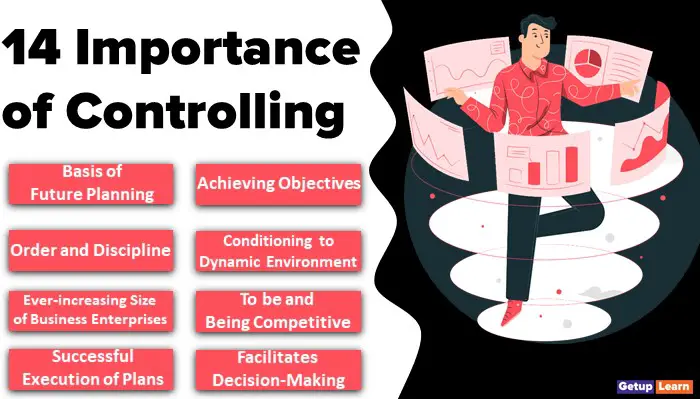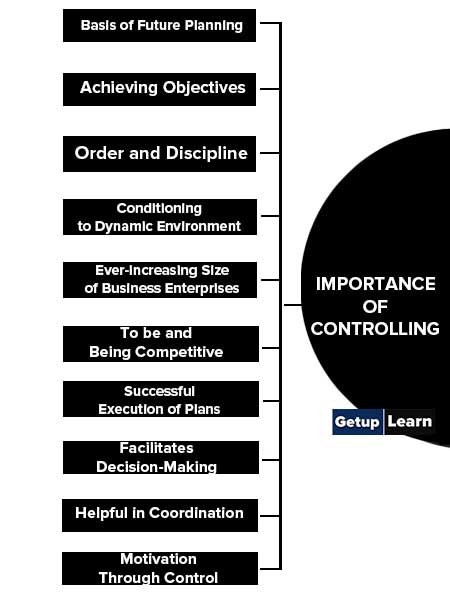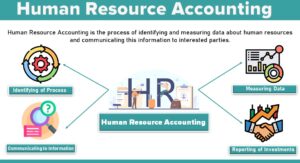
Table of Contents
-
1 Importance of Controlling
- 1.1 Basis of Future Planning
- 1.2 Achieving Objectives
- 1.3 Order and Discipline
- 1.4 Conditioning to Dynamic Environment
- 1.5 Ever-increasing Size of Business Enterprises
- 1.6 To be and Being Competitive
- 1.7 Successful Execution of Plans
- 1.8 Facilitates Decision-Making
- 1.9 Helpful in Coordination
- 1.10 Motivation Through Control
- 1.11 Detection of Mistakes
- 1.12 Improvement in Performance
- 1.13 Economy
- 1.14 Facilitates Performance Appraisal
- 2 FAQ Related to the Importance of Controlling
Importance of Controlling
The importance of controlling can be explained with the help of the following points:
- Basis of Future Planning
- Achieving Objectives
- Order and Discipline
- Conditioning to Dynamic Environment
- Ever-increasing Size of Business Enterprises
- To be and Being Competitive
- Successful Execution of Plans
- Facilitates Decision-Making
- Helpful in Coordination
- Motivation Through Control
- Detection of Mistakes
- Improvement in Performance
- Economy
- Facilitates Performance Appraisal

Basis of Future Planning
Controlling makes it possible to perform business activities as per plan. In controlling, deviations are found by evaluating the performed work and comparing it with predetermined objectives and standards.
In the process, a large number of facts and information are collected, which can be used in future for sound planning.
Achieving Objectives
Controlling contributes significantly to the achievement of organizational objectives. By controlling, efforts are made to bridge the gap between actual results and desired results and performance is brought closest possible to the predetermined objective.
According to William Gulick, “As barometer operates air conditioning system efficiently, similarly control plays a positive role in achieving desired results of the organisation”. This is another importance of controlling.
Order and Discipline
A Good controlling system contributes to maintaining order, discipline and honesty in the business. An effective controlling system motivates every member of the organisation to voluntary compliance with standards, rules and norms of behaviour.
By this, order and discipline are maintained and the members of the organisation are not tempted to resort to wrong ways and dishonesty. McFarland writes In this regard, “It should be noted that control can not cure habitual dishonesty in all cases.
But management shall be regarded irresponsible if it does not make a reasonable effort to maintain discipline and honesty among its employees through the effective control system.” This is another importance of controlling.
Conditioning to Dynamic Environment
The environment of modern business is totally dynamic and changing. Today business has to work in a constantly changing environment. Techniques, products, competition, consumer behaviour, state policies, corporate and industrial laws, employees’ behaviour, social, cultural and religious practices etc.
All things are prone to change. In such a dynamic environment only that business can survive and exercise effective control of its activities. Therefore, to develop adaptability to a dynamic environment, controlling is inevitable.
Ever-increasing Size of Business Enterprises
In the past few years, the size of business organisations is constantly increasing. Now the scope of the business has extended to national and even international borders by crossing local limits. Multinational companies and corporations have been incorporated, branches of which are spreading to a large number of countries.
Complexities in working and activities have also increased along with the increasing size of business organisations. The process of computerization and automation has increased them. They have integrated the whole world through modern information technology, information system and the internet working.
In such a case, to bring uniformity in the working practices of an organisation an effective controlling system is required. This is another importance of controlling.
To be and Being Competitive
Controlling helps not only make an organisation competitive but also in maintaining it to be competitive. Controlling management can keep an organisation ever competitive by checking wastage and optimally utilizing available resources.
Successful Execution of Plans
Controlling contributes significantly to the success of planning. Control ensures that every activity of the organisation is performed in accordance with the plans.
It ensures the successful execution of plans. Terry and Franklin have written, “Failure of controlling means sooner or later failure of planning and success of planning means the success of controlling.”
Facilitates Decision-Making
Controlling is a process related to finding out deviations in performance by comparing actual performance with desired performance and taking corrective actions to overcome them.
During this process, management takes decisions regarding measures to be taken for corrective action, by which it becomes acquainted with the decision-making process. Therefore, it is said that “Executive decisions are primary control decisions”.
Helpful in Coordination
Controlling is to make efforts in the direction of systematizing all activities keeping in view the predetermined objectives and their accomplishment. This effort at controlling renders valuable help in bringing coordination in different activities.
In addition to this, controlling brings unity in diversity and unity in actions for preventing wastage of money, machine, time, efforts etc. by which achieving coordination becomes easy. This is another importance of controlling.
Motivation Through Control
Controlling helps motivate the employees of an organisation. For exercising control actual performance is evaluated. The employees are motivated to better performance by rewarding them in accordance with their performance.
Moreover, the employees of the organisation never like things to get out of control, because in such cases it becomes impossible to predict what will impact of it them. In many cases, in such situations, they become victims of the whims and caprice of the management rather than the beneficiaries.
Detection of Mistakes
In controlling, employees’ actual performance is evaluated and compared with predetermined objectives and standards by which it can be detected where the employees remained deficient in performance. To overcome such deficiency effective remedial steps are taken immediately. By it the organisation avoids losses.
Improvement in Performance
By acquainting the employee concerned with mistakes and deficiencies detected in his performance during the controlling process and guiding him on how he can overcome his mistakes and deficiencies, the desired improvement can be brought in the performance of employees.
Economy
A sound controlling system brings down the total cost and per unit cost by exercising effective control on misspending and misutilisation and wastage of resources.
Control puts a check on losses accumulating by taking timely corrective action to overcome the deviations, by which the organisation can be run economically.
Facilitates Performance Appraisal
An essential step in the controlling process is the evaluation of actual performance. Through it, we can easily find out what has been the performance of the employees and an objective evaluation of the employees becomes possible.
What is the importance of controlling?
The following is the importance of controlling:
1. Basis of Future Planning
2. Achieving Objectives
3. Order and Discipline
4. Conditioning to Dynamic Environment
5. Ever-increasing Size of Business Enterprises
6. To be and Being Competitive
7. Successful Execution of Plans
8. Facilitates Decision-Making
9. Helpful in Coordination
10. Motivation Through Control
11. Detection of Mistakes
12. Improvement in Performance
13. Economy
14. Facilitates Performance Appraisal.















